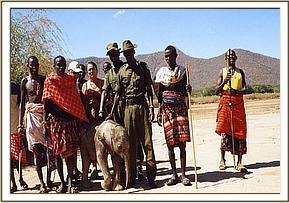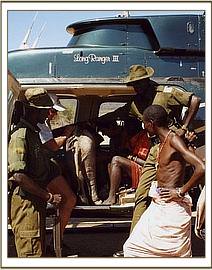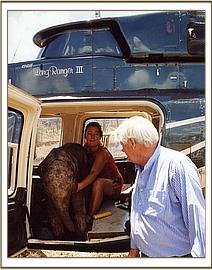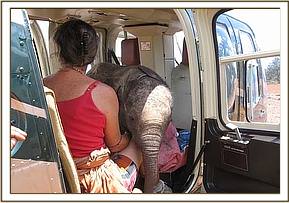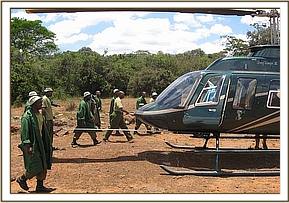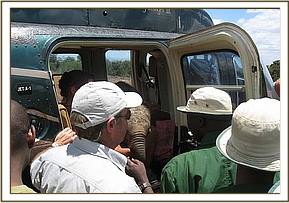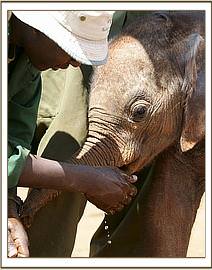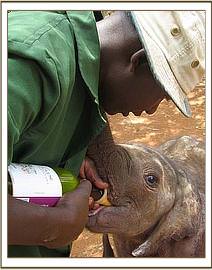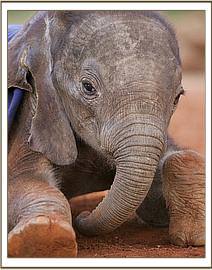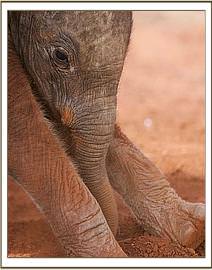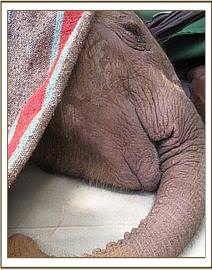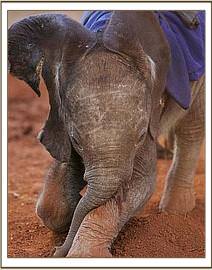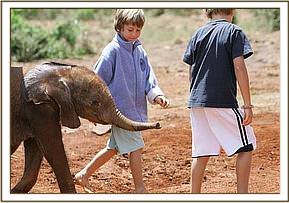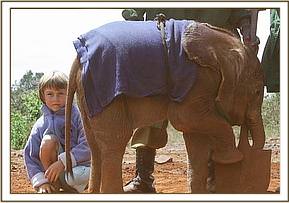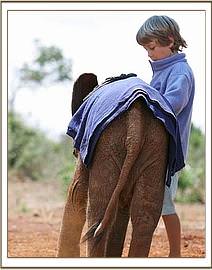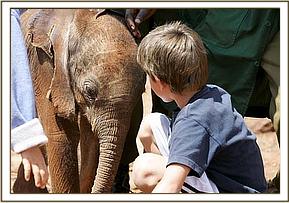






Now living wild, though she continues to visit us regularly
Current age
19 years old
Gender
Female
Rescued date
15 October 2006
Rescue location
Samburu, Milgis Lugga
Date of birth (estimate)
5 September 2006
Reason orphaned
Man-made cause for separation
Age at rescue
1 month old (approx)
Current location
Living Wild
She was rescued from this deep sand well by the brother of a very respected Samburu Chief named “Lesanju” who died only very recently, and at the request of the rescuer (his brother) and Helen Douglas-Dufresne, who heads the recently formed Milgis Trust and was instrumental in coordinating the rescue and saving this tiny calf, our latest little elephant has been named “Lesanju”.
She is only about 4 weeks old, and she arrived in a Helicopter that landed, literally, at our doorstep, kindly loaned by Mr. Halvor Astrup, the owner of Enoiset Ranch near Nanyuki. The little elephant had been without her mother for some 36 hours before being rescued and had been held at a remote Samburu manyatta far removed from any road or airfield, so nothing but a Helicopter could activate this rescue. Too young to know fear she was loaded in the back of the Helicopter with Helen by her side for the flight from the North to Nairobi. On arrival she trustingly walked from the Helicopter with the Keepers to her waiting stable, where she was fed her first bottle of milk and given the first precautionary antibiotic injection to guard against pneumonia and other stress related conditions that depress an animal’s natural immune system. We are deeply grateful to Mr. Astrup for so kindly collecting this baby from such a remote destination, and furthermore for going the extra mile and bringing her to us in his Helicopter, which saved us a great deal of trouble, particularly on a Sunday! We are also very grateful to Helen Douglas-Dufresne for coordinating the calf’s rescue, and to the Helicopter Pilot, Phil Mathews who once headed the KWS Airwing, so is well known to us.
It is customary amongst the pastoral Samburu people to mark their animals by cutting an ear, and sadly, the orphaned baby elephant underwent similar initiation. A large wedge of her right ear has been severed entirely, and the other ear slashed with a deep gash that has interrupted the blood supply to its lower half. As a result she lost some of that ear as well. Helen and her colleagues within the Milgris Trust will be doing their best to educate the Samburu people of the area that an elephant needs intact ears, for they are the means by which it regulates temperature, and that the ears of an elephant are a very important part of the animal’s anatomy. Well meaningly, little “Lesanju’s” captors also tried to feed her cows’ milk and maizemeal gruel, and assuming that she may have ingested even a little, neither of these will do her digestive system any good, so we have had some difficulty stabilizing that. However, apart from the mutilated ears, and incorrect feeding, she arrived in reasonable physical condition. The ears will heal, and will make her always identifiable, in the same category as some of our other orphans who have suffered damage to their ears, for instance Burra, whose one ear was almost cut in half by a wire snare, Laikipia and Loisaba whose ears were similarly “marked” by their Samburu captors) and Kinna and Kamboyo who suffered sun damage to their ears in very early babyhood when in a perfect world they should have been sheltered beneath their mother’s belly.
She was rescued from this deep sand well by the brother of a very respected Samburu Chief named “Lesanju” who died only very recently, and at the request of the rescuer (his brother) and Helen Douglas-Dufresne, who heads the recently formed Milgis Trust and was instrumental in coordinating the rescue and saving this tiny calf, our latest little elephant has been named “Lesanju”.

View diary updates from across all our orphan units as written by the Keepers

In December 2018, many of our wild-living orphans, ably led by Emily, returned closer to home in the wet season. Included in their herd were some of the younger now independent orphans too!
By adopting, you play a vital role in the life of an orphaned elephant, rhino, or giraffe — helping us provide the round-the-clock, loving attention each one needs and deserves over many years, so they can ultimately reclaim their place in the wild.
Your adoption supports the 100+ orphans in our care at any given time, covering the cost of milk and food supplies, Keepers' salaries, veterinary treatment, and other essentials.

Celebrate your adoption with a personalised certificate, ready for you or your lucky gift recipient to print and display!

Each month, we send a detailed update about our Orphans’ Project direct to your email inbox, featuring photos, stories, and special highlights.

From the latest Keepers’ Diaries to a downloadable image gallery and more, adopters have exclusive access to our content library.
